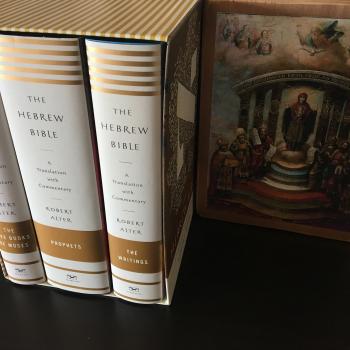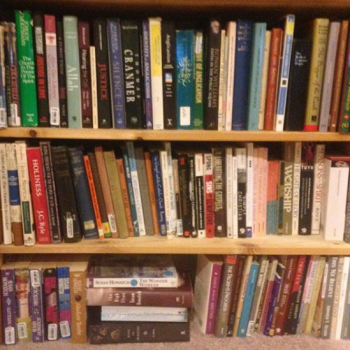![Eugene Peterson lecture at University Presbyterian Church in Seattle, Washington sponsored by the Seattle Pacific University Image Journal - by Clappstar, 16 May 2009 (Eugene_Peterson.jpg) (CC BY 3.0 [https://creativecommons.org/licenses/by/3.0/deed.en]), via Wikimedia Commons](https://wp-media.patheos.com/blogs/sites/721/2017/07/Eugene_Peterson.jpg)
He was also the subject of some controversy last week when Religion News Service’s Jonathan Merritt asked him about his views on same-sex marriage as part of a series of interviews he conducted on Peterson’s long career, occasioned in part by the publication of Peterson’s new book, As Kingfishers Catch Fire, a collection of essays on spiritual theology in the pastorate (what else?). After initially saying that he would perform such a wedding if asked to do so, he then retracted his statement in the Washington Post, stating instead that he holds to the ‘biblical’ view that marriage is between one man and one woman and that he hopes to never be asked to officiate at the wedding of a same-sex couple.
Peterson’s remarks ignited a storm of discourse in the world of what might be called ‘evangelicalism,’ a very difficult entity to pin down; it’s mostly associated with Protestant Christianities, but I am starting to think that the boundaries are even looser than that. Some ‘evangelicals,’ if I’m allowed to call them that, felt that the remarks were tantamount to heresy; the question has even been floated about whether they should be reading The Message in light of the comments. For others, this was a sign of evangelicalism’s materialism: Merritt reported that the timing of the retraction seems to have come in light of LifeWay (‘America’s largest Christian book chain,’ Merritt wants us to know) threatening to pull all of Peterson’s books, the author David Gushee then wrote that this was the ‘evangelical establishment’ closing in on Peterson’s livelihood, and the singer Vicky Beeching (about whom I have written about in a two-part series while I was an Anglican, first gushing about her music, and second, thinking through what her coming-out story might do for the ‘Anglican realignment’) decrying the link between evangelicalism’s anti-gay stances and its money machine. With such analyses edging dangerously close to the materialistic conclusion that Peterson retracted his affirmation of same-sex marriage because of the money, a friend of Peterson’s has written to say that as a matter of character, this is not the kind of person that Peterson is, as love of money and reputation are precisely what he denounces as a matter of his spiritual theology.
Like most things in the world of evangelicalism, it would be easy to write off this fiasco as restricted to the small bubble of a world that evangelicals have constructed for themselves, the interest of TIME, the Washington Post (in which Peterson issued his retraction), First Things, and (most importantly) People Magazine be damned. In fact, I wrote on my Facebook that the whole thing was such a tempest in a teapot that the true controversy, especially in light of Peterson’s previous comments in 2014 seeming to come to a change of mind on same-sex marriage, would have been if Peterson had retracted his endorsement given over ten years ago to the True Love Waits anthem ‘Wait for Me’ by Rebecca St James.
Evangelicalism in this sense – and as I am frequently tempted to see it – seems like a world unto itself. Why should I, especially from the ecclesial house of Kyivan Catholicism, care? Am I not supposed to be keeping a blog about Eastern Catholicism? Why should I care about the petty squabbles of people with whom I am not in communion, except to laugh at how bizarrely entertaining and hilariously parochial the stakes of power and terms of debate are?
The problem is that it is much easier to say that I’d like to write this episode off than to actually write it off. Perhaps the media circus around this can be blamed. Or maybe it is that sex sure does get a rise out of people. Or perhaps it is that all the talk about evangelicalism’s capital machine and the monetary losses that Peterson might be accruing makes it feel like we are finally getting somewhere with talking about the relationship between evangelicalism and capital – finally, we might say, even some self-professed evangelicals themselves are talking critically about the materialist underpinnings of the evangelical machine.
Whatever the reason is, Peterson is one of the evangelical controversies that seems to be getting people talking recently; the others from last week seem to be a) a documentary in which the homeschooled darling of youth group courtship workshops Josh Harris talks to people about ‘surviving’ his book I Kissed Dating Good-bye and b) the former president of Fuller Theological Seminary, Richard Mouw, seeming to endorse the Chinese government over against critics of its religious freedom policies and human rights violations. But even with something as important as Protestantism in the People’s Republic of China, all of the talk is – at least on the surface – restricted to the world of Protestantism, if one wanted to be generous – most would say that everything’s happening within a strand of ‘evangelical Protestantism,’ though most of them would be at a loss to articulate just what this ‘evangelicalism’ actually is. It would seem, in other words, that all of this is just Protestants talking to other Protestants about Protestantism.
What might be of interest to those who are not Protestants, however, is how the talking is structured. In many ways, what Peterson (and for that matter, Harris and Mouw) actually said does not matter very much. Instead, what seems to be matter more are their intentions. Why did Peterson endorse same-sex marriage? What was Peterson thinking? Why did he retract? Was it for the money? Could we, as his friend wrote, come to a better understanding of his motivations if only we got to know him?
Speculating on these questions is interesting enough – I find it even more fun than generating theories for Game of Thrones, actually – but it is through them that one is drawn into the vortex of what turns out to be a kind of ‘intentionality politics,’ if you will. Some questions that might be raised for me and others who have written about this, along with eyebrows, include: Why are you interested? Why would you be writing about this? Is it for the clicks, the hits, the money? Isn’t it because you’re just his friend? Do you think he did it for the money? Do you think he did it because he felt the uncomfortable feeling that all sexual minorities feel when the moment they speak, they are thrown under the bus? Do you have a stake in writing because of your identity? Is it that you are gay or lesbian or bi or trans or queer, or that you have a friend or family member who is? Are you defending a powerful religious institution? Why would you be writing if you weren’t trying to influence someone to your point of view? What is the point of view behind your point of view? What is your real intention in talking about all of this talking?
With such a line of questioning, the irony is that we are no longer in the world of Protestantism or the bubble of evangelicalism, however these boundaries are defined. We are in the world, period – our world, our common home, and in many ways, it is a world that the practices I have attributed to the vortex of an evangelical reality TV show of sorts have been building. A wild romp of an article appeared in the Italian Jesuit periodical La Civiltà Cattolica last week with caricature after caricature of the ‘ecumenism of hate’ that had been formed between ‘evangelical fundamentalists’ and ‘Catholic integralists’ in the world of Trump, but what the piece lacked in accuracy, it made up with earnest interest in how conservative Protestants and Catholics had not only built a world of their own, but had also been active in making the world in which we all live. As another piece from a weary Seattle activist asking to be ‘excommunicated from the church of social justice’ pointed out, this focus on intentionality is not restricted to the evangelicalism of which she was once a part, but also the secular activism of which she had grown tired. This world – one where intentions matter more than actions, where Peterson’s thoughts about one issue matter more than his entire career of pastoring and writing – is the one in which we all live. It is the world that has arguably produced the phenomenon of Donald Trump; it is also the world that is trying to bring him down by examining his intentions with regard to Russia; indeed, it is a world where security states seek to probe the thoughts and intentions of individual minds and hearts and where those same individuals are responsible for the privacy settings on their social media.
The tragedy in this firestorm around Eugene Peterson is that such a world of pure intentionality is not one that he has been trying to build; in many ways, he has rejected it, yet he is still caught up in it. You don’t need to be Peterson’s friend to know this (I am not), and you don’t need to even have read his books (although that might help); you just need to have skimmed Merritt’s three-part series with him. In them, Peterson says what he has always said: writing is art, pastoring is about getting to know people, a consumer mentality is toxic for relationships, and people have complicated stories where the presence of G-d might surprise you. It’s in this context that he talks about being done with writing: he has ‘pretty much mined everything I’ve learned and made art out of it.’ It’s with such a framework that he calls Trump the ‘enemy’ because he has ‘no morals’ and ‘no integrity,’ yet in the next sentence says that he has ‘good friends who think he’s wonderful’ but ‘put up with it less and less.’ It’s with this in mind that he tells the story of a young man whom he had pastored saying that he was openly gay and successfully applied for his church’s music directorship.
Pastoring, writing, getting to know people: these are practices that precede intentions, putting persons before ideology. The world that Peterson is trying to build is a rejection of ‘a whole part of the Christian church that operates in fear’ and a ‘consumer mentality’ that is ‘about what we can sell and how to attract people to come to church.’ Peterson is saying that the real world, as it were, is not caught up in these things, but in the actual messy lives of people you have to know by name, face-to-face, in a small community. This, in fact, is the real reason Peterson translated The Message in the first place: as he states in numerous places, including in the introductory passages of The Message, he did it to facilitate Bible studies for people in his own church so that they would be able to hear G-d speaking to them in their own vernacular way of talking – this, of course, is also why some Asian American evangelicals have confessed to me in private that they don’t connect with The Message, as the idioms that might be familiar to a white person in Montana have no import for them.
It’s here, I think, that the Peterson fiasco takes on its true significance: beautiful as the small communitarian world that Peterson has tried for his entire career to build might sound, its limits are showing. Peterson’s Washington Post retraction from his same-sex marriage comments in fact reiterates this central focus on ‘extremely and essentially local’ pastoring and ends with a telling paragraph:
I regret the confusion and bombast that this interview has fostered. It has never been my intention to participate in the kind of lightless heat that such abstract, hypothetical comments and conversations generate. This is why, as I mentioned during this interview, I so prefer letters and will concentrate in this final season on personal correspondence over public statements.
In other words, Peterson thinks he can just walk away from his own public statements – indeed, that that is the more pastoral, artistic, and personal thing to do. In this, we learn what happens when the ‘extremely and essentially local’ world that Peterson has written about, taught, and practiced butts up against the world of pure intentionality that is the modus operandi of our entire world’s public sphere circuit, state policy, economic networks, and social media: Peterson just walks away as if this troubled world does not even exist. The walking away isn’t about his position about same-sex marriage or sexuality or sex; it’s saying that he can’t be bothered with the noisy world in which the rest of us live. In so doing, he’s made the firestorm worse – there is now more debate, more speculation, more buzz, more noise. Of course, knowing Peterson’s work, he probably thinks it’s his version of spiritual crucifixion, the price he has to pay for being misunderstood in a consumeristic world as a person who does better face-to-face, knowing your name in a small, ‘extremely local’ community. Peterson has been martyred for the sake of unplugging.
The question that this raises is severe: is the anti-consumeristic, small-community, hyper-local attempt to create an alternate ‘evangelicalism,’ ‘Protestantism,’ or even ‘Christianity’ even in the real world? Is not this strategy for withdrawal – which is advocated not only by Peterson, but also Marva Dawn, Stanley Hauerwas, Will Willimon, Norman Wirzba, and Wendell Berry – actually exacerbating the problems of noise and obsessions with intentionality in the plugged-in world where most of us live? Is it not the same as me saying that I am Eastern Catholic in a different ecclesial house and therefore have no interest in evangelicalism even when the election of Trump (which Peterson addresses) that is concomitant with the acceleration of a very consumeristic culture (which Peterson also addresses) are symptoms of a world that is common to all of us built in no small part by evangelicals whom we should have been engaging, debating, and eviscerating in the hopes of restoring some sense of the acting person, the common home, a rational public sphere, a civilization of love, and an economy that gives life?
Perhaps here we might come to understand why engaging with Christianities called ‘evangelical’ is important, especially for us who claim to have rejected them. For one, the boundaries are porous: one might criticize me for name-dropping in addition to Peterson a bunch of theologians who are more commonly associated with ‘mainline Protestantism,’ as if that is the polar opposite of ‘evangelicalism.’ The truth, however, is much weirder: ‘mainline Protestantism’ only refers to prominent Protestant denominations that have a wide swath of persons with varying ideologies and theologies, and ‘evangelicalism’ is so porous that it is not as if terms invented by mainline Protestants are not used in evangelicalism – I think, for example, of the word ‘missional’ from the Princeton missiologist Darrell Guder.
But for another, simply pretending that the world that the evangelical consumerism of the megachurch, the prosperity gospel, the marketing juggernaut, and social media does not exist, is not important to be engaged, or are not our problem because we claim not to be ‘evangelical’ might only make our common problems worse. One can, of course, debate what ‘evangelicalism’ means, or whether being an ‘evangelical’ is actually an identity that people really identify with, or what actually constitutes ‘evangelical Protestantism’ as a category. But when 81% of white evangelicals votes for Donald Trump, and ex-evangelicals write of their disappointment with the Left because ‘social justice churchiness’ is no less thought-policing than the evangelicalism that they thought they left, and something as organized as a media circus erupts around the translator of The Message, one cannot deny that it somehow exists despite no one really knowing what it is.
But writing about something as amorphous as a movement that exists by intention alone is difficult. And writing about networks of institutions that are so completely autonomous from each other that the very existence of a thing called ‘evangelicalism’ is often denied is next to impossible. And writing about it while having my own intentions questioned is tiresome. I understand why Peterson finds it easier to walk away. But to do so is to deny that our common home exists beyond our identity politics and ecumenical squabbles and that this obsession with pure intentionality is trouble that affects us all.
















